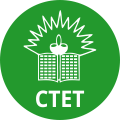Subject | Syllabus |
Child Development and Pedagogy a) Child Development | - Child Development: Concept of development and its relationship with learning, Principles of the development of children, Influence of Heredity & Environment.
- Socialization processes: Social world & children (Teacher, Parents, Peers)
- Concepts of child-centred and progressive education: Piaget, Kohlberg and Vygotsky, constructs and critical perspectives., Critical perspective of the construct of Intelligence, Multi-Dimensional Intelligence, Language & Thought.
- Gender as a social construct: gender roles, gender – bias and educational practice, Individual differences among learners, understanding differences based on diversity of language, caste, gender, community, religion, etc.,
- The distinction between Assessment for learning and assessment of learning: School-Based Assessment, Continuous & Comprehensive Evaluation., perspective and practice, Formulating appropriate questions for assessing readiness levels of learners, enhancing learning and critical thinking in the classroom, and assessing learner achievement.
- Concept of Inclusive education and understanding children with special needs: Addressing learners from diverse backgrounds including disadvantaged and deprived Addressing the needs of children with learning difficulties, ‘impairment’ etc., addressing the Talented, Creative, Specially abled Learners
- Learning and Pedagogy: How children think and learn; how and why children ‘fail’ to achieve success in school performance.
- Basic processes of teaching and learning: children’s strategies of learning, learning as a social activity and social context of learning, Child as a problem solver and a ‘scientific investigator’.
- Alternative conceptions of learning in children: understanding children’s ‘errors’ as significant steps in the learning process. Cognition & Emotions, Motivation, and learning, Factors contributing to learning – personal & environmental
|
(b) Concept of Inclusive education and understanding children with special needs c) Learning and Pedagogy | - Addressing learners from diverse backgrounds including disadvantaged and deprived
- Addressing the needs of children with learning difficulties, ‘impairment’ etc.
- Addressing the Talented, Creative, Specially-abled Learners
- How children think and learn; how and why children ‘fail’ to achieve success in school performance.
- Basic processes of teaching and learning; children’s strategies of learning; learning as a social activity; social context of learning.
- Cognition & Emotions
- Motivation and learning
|
Language 1 | - Language Comprehension Reading unseen passages – Answering the question based on the given unseen passage. (Prose, Drama, or Poetry.)
- Pedagogy of Language Development: Learning and acquisition, Principles of Language Teaching, Role of listening and speaking, the function of language and how children use it as a tool. A critical perspective on the role of grammar in learning a language for communicating ideas verbally and in written form. Challenges of teaching language in a diverse classroom and Language Skills.
- Teaching-learning materials: Textbook, multi-media materials, multilingual resources of the classroom, Remedial Teaching
|
Language 2 | - Language Comprehension Reading unseen passages – Answering the question based on the given unseen passage. (Prose, Drama, or Poetry.)
- Pedagogy of Language Development: Learning and acquisition, Principles of Language Teaching, Role of listening and speaking, the function of language and how children use it as a tool. A critical perspective on the role of grammar in learning a language for communicating ideas verbally and in written form. Challenges of teaching language in a diverse classroom and Language Skills.
- Teaching-learning materials: Textbook, multi-media materials, multilingual resources of the classroom, Remedial Teaching.
|
Mathematics | - Geometry
- Shapes & Spatial Understanding
- Solids around Us
- Numbers
- Addition and Subtraction
- Multiplication
- Division
- Measurement
- Weight
- Time
- Volume
- Data Handling
- Patterns
- Money
- Nature of Mathematics/Logical thinking; understanding children’s thinking and reasoning patterns and strategies of making meaning and learning
- Place of Mathematics in Curriculum
- Language of Mathematics
- Community Mathematics
- Evaluation through formal and informal methods
- Problems of Teaching
- Error analysis and related aspects of learning and teaching
- Diagnostic and Remedial Teaching
|
Environmental Studies | - Our Environment: Major components of the environment, types of ecosystem, life diversity and its features, food chain, and nature balancing factors, Food web, ecological Pyramids, Plant and animal species, factors of Biodensity, Tropic levels, Types of pollution, reasons – effects – remedial measures, greenhouse effect, greenhouse gasses, sustainable development and its maintenance, waste management measures. Environment movements (Related to state and national level), Important Environment activists, state and national award-winning literature, and writers related to the environment, major environmental phenomena, and types of ecological conservation.
- Living world: Life processes, classification of organisms. How do organisms reproduce? Cell, Tissues, Organs, and organs system.
- Sources of Energy: Solar Energy, Wind Energy, Tidal Energy, Geothermal Energy, Biodegradable wastes, non-biodegradable wastes, and Chemicals in our daily life.
- Human Health and Hygiene: Carbohydrates: Types of Monomers, lipids, proteins, Vitamins, Minerals, Deficiencies.
- Natural Phenomena: Motion, Force, Gravitation, Newton’s laws of motion, distance – speed graphs.
|



